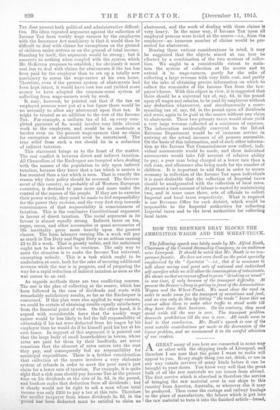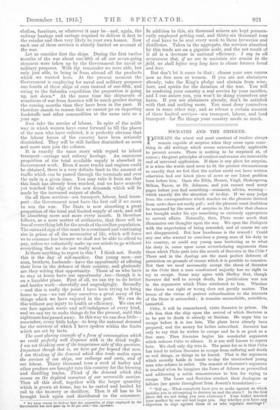HOW THE BREWER'S DRAY BLOCKS THE AMMUNITION-WAGON AND THE WHEAT-TRUCK.
The following speech was lately made by Mr. Alfred Booth, Chairman of the Cunard Steamship Company, to an audience near Liverpool. It should be noted that Mr. Booth is no tem- perance fanatic. He does not even dwell on the point specially emphasized by the "Spectator "—i.e., that it is nonsense to talk about saving and great acts of national and individual self-sacrifice while we still allow the consumption of intoxicants. He shows us that we cannot afford to go on "drinking as usual" in war time, if only because of the transport difficulty. At present the Brewer's Dray is getting in front of the Ammunition- Wagon and the Wheat-Truck. We must clear the road in order to make room for the transport of munitions and food, and we can only do this by letting "the trade" know that we cannot allow them to order other traffic to stand aside till they have done their business. On the contrary, they must stand aside till the war is over. The transport problem demands prohibition till the war is over. All roads seem to lead to that conclusion. Mr. Booth's speech is one of the most notable contributions yet made to the discussion of the liquor problem, and we recommend it to the careful attention of our readers.
AGREAT many of you here are connected in some way, or other with the shipping trade of Liverpool, and therefore I am sure that the point I want to make will appeal to you. Every single thing you eat, drink, or use in any way entails services of many kinds before it can be brought to your doors. You know very well that the great bulk of all the raw materials we use comes from abroad. The first service which is absorbed is therefore the Beryl°e of bringing the raw material over in our ships to this country from America, Australia, or wherever else it may be produced. Then come the cartage and railway haulage to the place of manufacture, the labour which is put into the raw material to turn it into the finished article—bread, clothes, furniture, or whatever it may be—and, again, the railway haulage and cartage required to deliver it first to the retailer and then very likely to your own homes. Now each one of these services is strictly limited on account of the war.
Let us consider first the ships. During the first twelve months of the war about one-fifth of all our ocean-going steamers were taken up by the Government for naval or military purposes. With the remainder we were able, but only just able, to bring in from abroad all the products which we wanted here. At the present moment the Government is employing for naval and military purposes one-fourth of these ships of ours instead of one-fifth, and owing to the Salonika expedition the proportion is going up, not down.* At the same time the shipments of munitions of war from America will be much greater during the coming months than they have been in the past. It therefore stands to reason that we cannot go on importing foodstuffs and other commodities at the same rate as a year ago. Now take the service of labour. In spite of the noble way in which women have come forward to fill the places of the men who have enlisted, it is perfectly obvious that the labour forces of the country have been seriously diminished. They will be still further diminished as more and more men join the colours. It is exactly the same story with regard to inland transport—cartage and railway haulage. An enormous proportion of the total available supply is absorbed in Government work. Even if more trucks and engines could be obtained, there is a very definite limit to the amount of traffic which can be passed through the terminals and over the rails in a given time. You may take it from me that this limit has already been reached, and we have scarcely yet touched the edge of the new demands which will be made by the increased output of shells. On all these services—sea transport, labour, land trans- port—the Government must have the first call if we mean to win the war. The State is now absorbing a great proportion of the total and limited supply of each, and will be absorbing more and more every month. It therefore follows, as a mere matter of arithmetic, that there will be less of everything left for the needs of the civilian population. The outward sign of this must be a continued and continuing rise in prices of all the necessaries of life, which will force us to consume less because we shall not be able to afford to pay, unless we voluntarily make up our minds to go without everything that we do not really need. Is there anything to regret in this / I think not. Surely this is the day of self-sacrifice. Our young men—our sons, brothers, husbands—have the opportunity of offering their lives in the defence of their country, and gloriously are they seizing that opportunity. Those of us who have to stay at home have our opportunity .too—though it is on a humbler plane. First of all, we can try to do better and harder work—cheerfully and ungrudgingly. Secondly —and this is really die point I have been trying to bring home to you—we can deny ourselves a great many of the things which we have enjoyed in the past. We can do this without any injury to health or efficiency. We can set our face against waste and self-indulgence of every kind, and we can try to make things do for the present, until this nightmare has passed away. In this way we can do a little— remember, every little helps—to keep the national demand for the services of which I have spoken within the limits which are set by facts.
The most glaring example of a form of consumption which we could perfectly well dispense with is the drink traffic. I am not thinking now of the temperance side of this question. Important though that is, we have got far beyond that now. I am thinking of the demand which this trade makes upon the services of our ships, our railways and carts, and of our labour. Thirty thousand tons a week of barley and other produce are brought into this country for the brewing and distilling trades. Think of the demand which this means on the depleted resources of our mercantile marine. Then all this stuff, together with the larger quantity which is grown at home, has to be carted and hauled by rail to the brewery or distillery. Then it all has to be brought back again and distributed to the consumer.
We have reason to believe that the proportion of ships employed by the Government has now gone up to 30 per oent,—.ED. Spectakir. In addition to this, six thousand miners are kept perman- ently employed getting coal, and thirty-six thousand tons of coal have to be sent every week to these breweries and distilleries. Taken in the aggregate, the services absorbed by this trade are on a gigantic scale, and the net result of it all is a decrease in national efficiency. I say in all seriousness that, if we are to maintain our armies in the field, we shall before very long have to choose between bread and beer.
But don't let it come to that ; choose your own course now as free men or women. If you are not abstainers already, take the King's pledge and abstain from wine, beer, and spirits for the duration of the war. You will be rendering your country a real service by your sacrifice, and I can assure you, you won't be doing yourselves any harm. If you are abstainers already, don't be satisfied with that and nothing more. You must deny yourselves now in some other way, and so release a certain amount of these limited services—sea transport, labour, and land transport—for the things your country needs so much.



















































 Previous page
Previous page